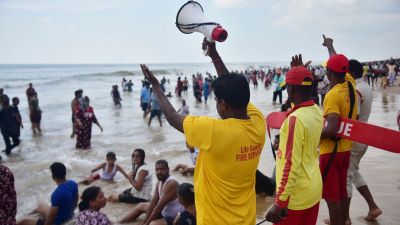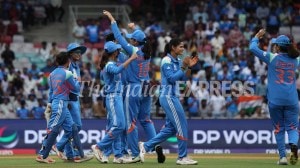President unfolds India Empowered map looking at the road less travelled
A mother fights back tears and asks the highest Constitutional authority in the land: Do you have a plan to ensure that no honest young Indi...

A mother fights back tears and asks the highest Constitutional authority in the land: Do you have a plan to ensure that no honest young Indian ever faces the hapless fate of my murdered son?
Senior functionaries of the ruling party air their frustration at government red tape and callousness. Young MPs underline that a resurgent India cannot afford to ignore the unmet needs of a struggling Bharat. And President A P J Abdul Kalam makes a powerful presentation on ‘‘connectivity’’ in all its dimensions, laced with a message of indomitable hope: “problems should not become your captain, you must become the captain of your problem and succeed.’’
At the end of a unique day-long conclave of conversation hosted by The Indian Express as part of its India Empowered initiative (India Empowered: Roadmap for Tomorrow) it became clear that empowerment—a big word—isn’t some weighty, abstract notion, but a pulsating idea that evokes both hope and frustration, engenders consensus as well as debate, and holds out a great promise and a much greater challenge for every one of India’s one billion citizens.
The India Empowered conclave, culminating an initiative by the Indian Express through news stories as well as 126 front-page articles by India’s key agents of change, was addressed today by the President and was followed by a lively interactive session with the chief executive gamely answering a host of questions.
Later in the afternoon, a panel of young professionals—members of Parliament, businessmen and sportspersons—agreed on the broad vision of an empowered India while arguing about the methods to achieve that ideal, while their seniors heard them with attention and offered their own more ‘‘seasoned’’ interventions. In his detailed presentation, Kalam made it clear that he had been fired by the India Empowered series—which started with his article on 14 August 2005—and his team had studied all the articles and grouped them under different categories.
Describing them as a ‘‘Garland of Ideas for Empowered India’’, he highlighted some of the ‘‘flowers’’ in the series such as the evocative line penned by M. Shanmugam (father of slain Manjunath): ‘‘When no father, like me has to grieve because his child was killed for honesty’’ or his predecessor K R Narayanan’s words just days before he died: ‘‘Only when the suppressed and the exploited begin to assert their rights’’, or Dipankar Bhattacharjee’s ‘‘When human dignity is not a privilege of the few.’’ M S Swaminathan’s ‘‘When hunger is history and gram swaraj a reality’’ and Aruna Roy’s “When we have the political maturity to listen to the dissent of the deprived.” The President then went on to emphasise India’s potential to become a ‘‘knowledge society’’ and provided detailed figures to show how India was slowly but surely moving away from a predominantly agricultural economy.
Elaborating on his main theme of empowerment through connectivity, the President said, “the core of empowerment for prosperity of one billion people is the connectivity and partnership between governmental and multiple institutions in the public and private domains.” But his address was not just about statistics and pie charts and details on the ‘‘four grids’’ facilitating inter-connectivity between different sectors of the economy. He also emphasised that it was not enough to just talk of the responsibilities of government; people were equally responsible. ‘‘A great society is interwoven by fast responsive elected government and also righteous citizens’’, he said, and recited a hymn on righteousness. He usually asked his audience to recite along with him, but ‘‘since you are all big guns, I won’t ask you,’’ he said candidly, and had everyone laughing. But the interactive session started on a poignant note when Pramila Shanmugan, Manjunath’s mother, talked of the brutal murder of her 27-year-old son by a petrol pump owner and asked the President how could he ensure that it would not happen to others.
The President repeated that righteousness was the key and Manjunath’s righteousness came from his family. Kalam made it clear later that he had meant to be kind, that he believed that a tragedy must not break us but only strengthen our resolve to fight even harder. The same brusque optimism was on display to a range of questions which appeared to focus on the darker side of governance and empowerment.
To Union minister Kapil Sibal’s complaint that too little money and autonomy was given to science and technology, Kalam recalled his four decades in the S&T establishment, and underlined the need to adopt a ‘‘mission mode’’— asking not just for money and an assured schedule but also for ‘‘ a management structure’’ to implement a programme.
Dhananjay Dubey’s understandable cynicism about the prospects of real empowerment in light of his elder brother’s murder also met with the same response. No, he did not think that Dubey’s death should discourage parents from educating their children to become upright citizens, the President said. Recalling his professor’s advice, he said problems were inevitable in any endeavor. Dubey was dead but his death was not pointless. “You can’t let the problems become your master, your captain, you must defeat it and you will succeed.’’
The afternoon session was equally vibrant with a cross-section of voices and views on how exactly to achieve the dream of a fully empowered India. MPs Sachin Pilot, Manvendra Singh, Jay Panda, Mohammad Salim may belong to different parties but they all agreed that empowerment would be an empty word unless it made a difference to the lives of ordinary Indians still groping in the dark corners of India’s vast hinterland. Growth and equity must go hand in hand, rural and urban India must walk in tandem, the powerless and powerful must come together on the same platform of hope and justice for India to be a nation of truly empowered citizens, they said.






- 01
- 02
- 03
- 04
- 05

























